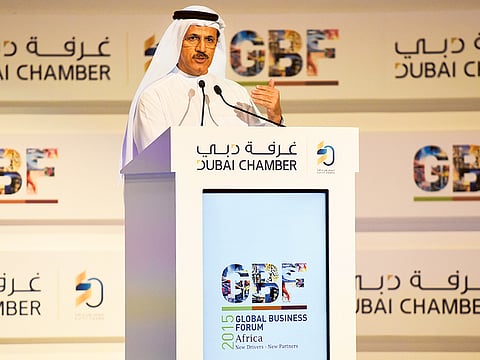Red tape, risk can harm Africa trade, Bin Sulayem warns
Red tape, risk can harm trade, says DP World chairman

DUBAI: African nations must do more to cut red tape and develop their infrastructure if they are to attract investment and trade, DP World Chairman, Sultan Ahmad Bin Sulayem, said in Dubai on Tuesday.
Addressing delegates at the Africa Global Business Forum, he said that countries must realise they are competing with states around the world for investment funds.
DP World operates two ports in Algeria and one each in Djibouti, Senegal, Egypt and Mozambique. “The six terminals we have are in partnership with the governments,” Bin Sulayem said at a session on the infrastructure of trade. “It’s working.”
But he said many investors were concerned about risk when considering African investments. DP World is currently in a dispute with the Djibouti government over its port concession there. Bin Sulayem said he could not discuss specifics, as the case was in arbitration, but added that the port is “contributing almost 12 per cent of GDP (gross domestic product) in Djibouti”. “The port is the most modern in Africa, with an amazing infrastructure,” he said.
“Today, if we were to invest in a developed market in Europe — we just built a port in England — it may be that the return is low, but it is safe.
“In Africa there is opportunity, but the risk is perceived by many people. We are investing, so we gave more courage than many people,” he added.
Further highlighting the attraction of growth in Africa, he said Ethiopia’s growth is 20 per cent, and that seven of the top 10 growth nations are in Africa, but warned the continent’s nations faced challenges in both hard infrastructure such as transport links and soft infrastructure such as education and the ease of doing business.
“There is a lot of pressure on infrastructure,” Bin Sulayem said. “Almost half the people of Africa today live in cities. That’s a challenge and an opportunity. You need to build infrastructure. Private-public partnerships are very important. The cash is available, but Africa is not the only place — other places in the world need that cash. They need to show transparency and that they will protect foreign investment.”
Raising money within Africa is difficult and expensive, he said, pointing to Nigeria’s 12 per cent interest rate.
But his greatest concern was the cost of bureaucracy in both time and money. “If you put a dollar value on it, it’s a huge amount,” he said. “The system has to adapt.”
He further suggested electronic data interchange (EDI), paperless processing, would help speed processing, increase transparency and reduce corruption. DP World had already helped introduce it to its ports in Algeria with the cooperation of the Algerian government.
Complex paperwork and poor transport links also made intra-African trade difficult, he said, suggesting that if it cost $2,000 (Dh7,340) to ship a container from China to the sea port at Mombasa, Kenya, it might cost another $45,000 to ship it from Mombasa to Uganda.
A briefing note by the Economist Intelligence Unit, commissioned by DP World and presented at the forum on Tuesday, suggested that the creation of the pan-African free trade zone could stimulate $1 trillion worth of economic activity.
Although the proposed trade block, which would harmonise trade between the East African Community, the Southern African Development Community and the Common Market for Eastern and Southern Africa is due to become active in 2017. It has yet to be ratified by national parliaments.
Sign up for the Daily Briefing
Get the latest news and updates straight to your inbox



